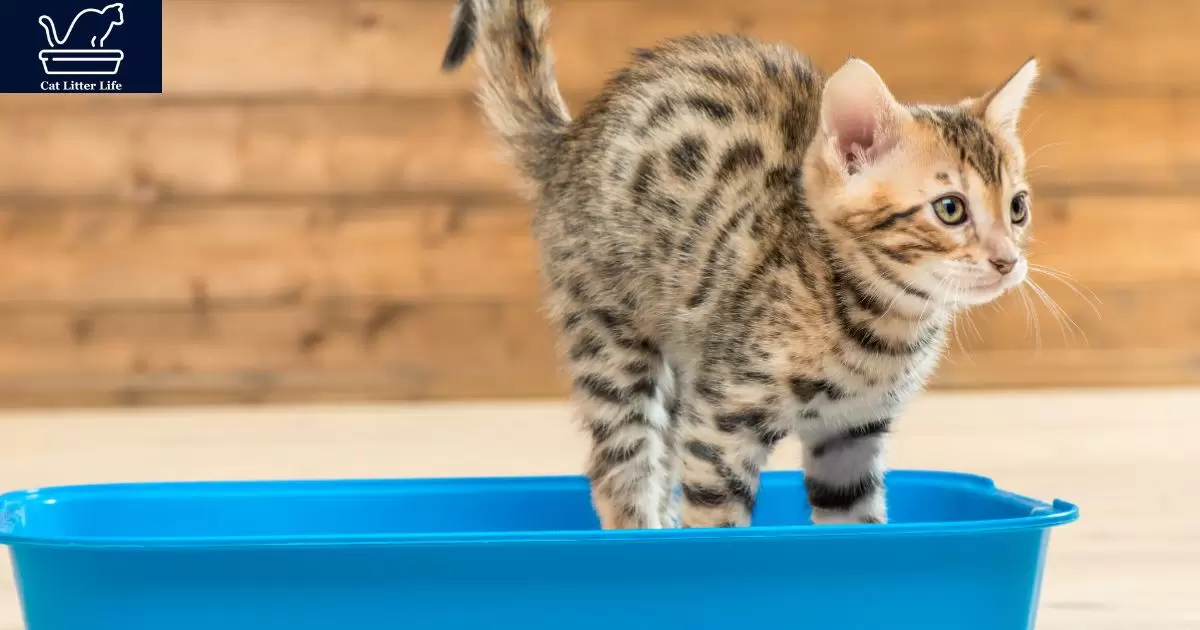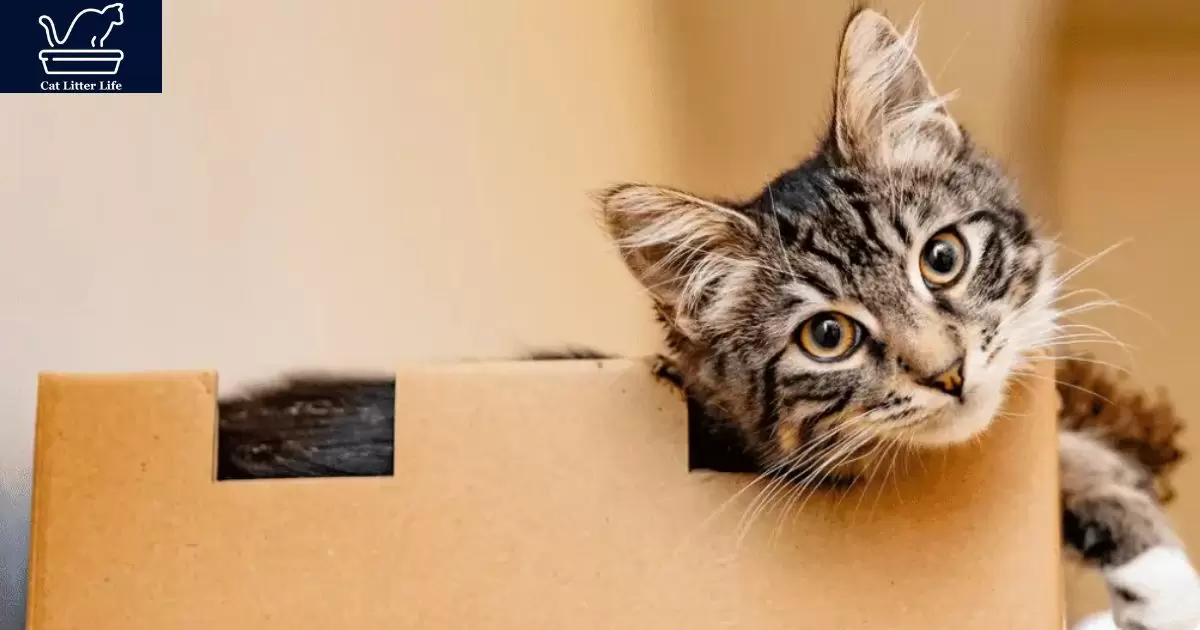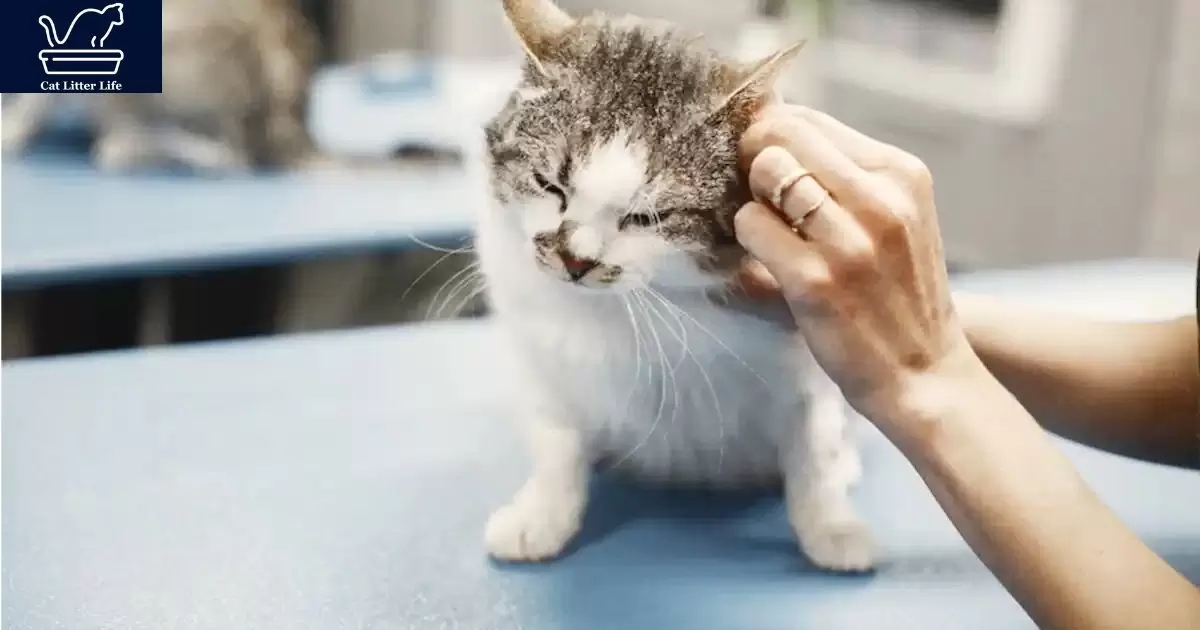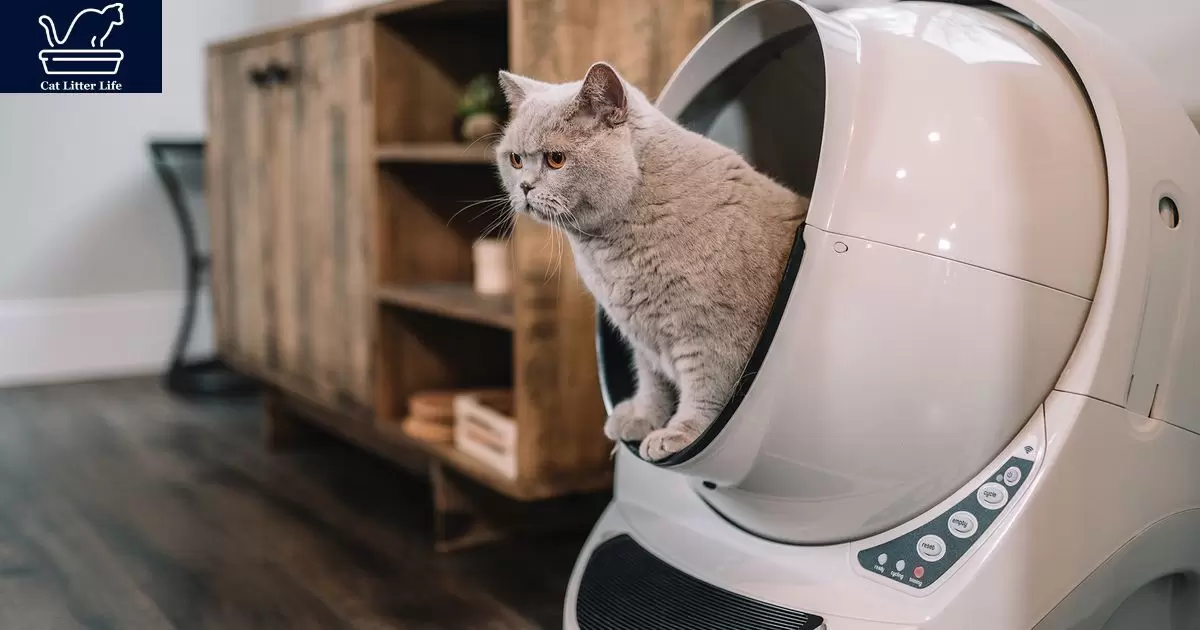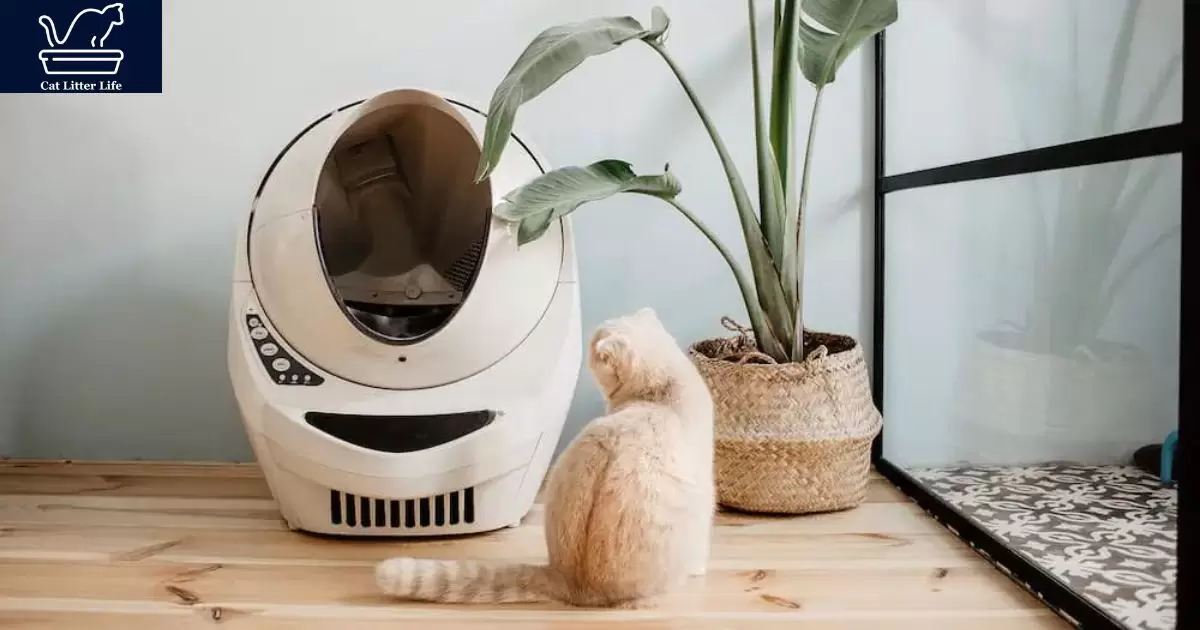Cats meowing while using the litter container refers to a cat making vocalizations whilst putting off waste inside the litter box. This conduct is not unusual in cats and can have several reasons. It may be an instinctive behavior related to vulnerability or communicating with humans.
Why does my cat meow when using the litter box? This peculiar feline behavior often puzzles cat owners. However, understanding the potential reasons can provide insight into your cat’s actions.
Meowing during litter box use may indicate a medical issue like discomfort urinating. It can also signal anxiety, preferences about litter box cleanliness, or a desire for privacy. Some cats seem to meow just to communicate with humans nearby. Determining the cause takes knowledge of your cat.
Key Takeaways
- Cats may meow in the litter box due to urinary tract infections, constipation, or arthritis causing discomfort when eliminated. A vet can diagnose and treat underlying medical issues.
- Litter box location, cleanliness, and type of litter impact feline preferences. Covered boxes or larger models may reduce stress.
- Changes in routine, multi-cat households, and stress can also prompt litter box meowing. More playtime and positive reinforcement help.
- Signs like straining, changes in litter habits, or vocalizing may indicate your cat is unwell. Have your vet examine arthritis signs or other common issues.
- To understand the cause, note patterns about when the meowing occurs and what the cat communicates through its behavior and vocalizations.
- Adjustments to litter and boxes along with veterinary guidance when needed can improve litter box etiquette and resolve inappropriate meowing.
Reasons Behind The Meowing Litter Box Behavior
When a cat meows in the litter box, it can seem peculiar and prompt questions from owners about that behavior. My cat’s litter smells so bad But there are a range of reasons a cat might meow when using its litter box.
Instinctive Behavior
Some experts believe meowing during litter box use is an instinctive behavior for cats. In the wild, cats feel vulnerable while eliminating, so they vocalize to alert other cats to their presence and territory. Domestic cats may retain this instinct.
Cats also use vocalizations to communicate with humans. So litter box meowing may simply be a cat’s way of connecting with its owner. This can be either attention-seeking behavior or communicating a need.
Discomfort or Pain
One of the most commonplace motives for litter container meowing is that the cat reports soreness or pain at the same time as urinating or defecating. Conditions like tom cat’s lower urinary tract disorder can make urination tough or painful.
Meowing while eliminating may indicate the cat associates using the litter box with that unpleasant sensation. Any accompanying signs like blood in the urine, excessive licking, or straining warrant a veterinary visit.
Litter Box Preferences
Cats can be quite particular about litter box cleanliness and the environment. Some cats may meow to indicate displeasure with a dirty or poorly maintained litter box. Cats also prefer large litter boxes that allow scratching and movement. Small, uncovered, or crowded litter boxes can cause anxiety.
Litter box location, type of litter, and sharing with other cats can also impact preferences. If the meowing only occurs with a specific litter box, adjusting to the cat’s preferences may help resolve it. This may take some experimentation to determine the source of dissatisfaction.
Anxiety or Stress
Like human beings, cats can revel in emotions of strain or anxiety. A busy, chaotic, or uncomfortable home environment can cause a cat immoderate strain. That anxiety may manifest as vocalizing when in the vulnerable position of using the litter box.
Cats also feel stress if another pet bullies them or makes them feel unsafe approaching the litter box. Any recent changes or disruptions at home could also trigger litter box anxiety. Ensuring the cat feels comfortable and stable at domestic is key.
Attention-Seeking Behavior
Some cats analyze that meowing inside the muddle container gets interest from their proprietors. The cat may have discovered its human comes running if they hear meowing coming from the litter box area.
This can turn into an attention-seeking ploy, especially for neglected cats craving interaction and play. Providing adequate exercise, play, and affection can help curb begging behavior. Ignoring attention-seeking meows may also discourage it.
Communication of Needs
From a cat’s viewpoint, meowing when using the litter box is communication – vocalizing to ask their human to address a need. The cat may want a tidier litter box, more privacy, or gentler litter material. The cat could also be signaling pain or discomfort.
Paying attention to any patterns around the vocalizing can provide hints to pinpoint the need. Meeting that need, like adding a litter box hood for privacy, resolves the communication issue. Understanding feline communication takes patience.
When Meowing Indicates a Medical Issue
In some instances, a cat meowing inside the muddle container can signal an underlying scientific problem requiring veterinary interest.
Discomfort When Urinating
Cats use the litter box multiple times a day, so urination issues quickly become evident. Discomfort, difficulty urinating, or bloody urine ought to cause a cat to meow throughout elimination.
Medical conditions like pussycat lower urinary tract sickness, bladder infections, bladder stones, or urethral obstructions can all make urination painful. Veterinary diagnosis is wanted to pick out and well deal with the condition inflicting the soreness.
Constipation or Diarrhea
Feline elimination issues at either end, diarrhea or constipation, can be accompanied by meowing during litter box use. Straining to defecate, pain passing stool, irritation to the anus, and other problems understandably cause a cat to vocalize.
Parasites, infections, digestive issues, or diet changes can trigger elimination problems. If the stool appears very loose, bloody, or mucus-covered, or the cat is straining to go, a vet visit determines the needed treatment.
Age-Related Issues
As cats grow older, conditions like arthritis make moving in and out of the litter box more difficult and painful. Senior cats may meow from that discomfort but also the frustration of not being as nimble.
Any difficulty getting in and out of the litter box or signs of pain during use warrant a veterinary visit. Providing a low-entry box with less litter may help an arthritic cat. However, medication for pain or joint issues may be needed.
Nerve Damage or Weakness
Underlying neurological issues can also cause a cat to vocalize when eliminated. Nerve damage, muscle weakness, or back pain can all contribute to litter box difficulties and discomfort.
Straining or unusual vocalizing are clues something is wrong. The cat may also have trouble squatting properly or appear unsteady. Consulting a vet helps diagnose the issue so proper treatment can help resolve the problem.
Determining the Cause of Litter Box Meowing
Since cats can’t explain why they are meowing in the litter box, some detective work is needed by owners. Here are some steps to determine the reason:
- Note any patterns like specific litter boxes, times of day, or connections to feeding.
- Have the cat examined by using a vet to rule out urinary tract infections and other scientific situations?
- Switch the litter box style or location if the cat seems uncomfortable or unsatisfied.
- Clean litter boxes more frequently in case cleanliness is an issue.
- Evaluate any recent changes in the home environment or routine that could be causing stress.
- Provide more interactive playtime and affection to dissuade attention-seeking.
- Ignore harmless meowing to discourage attention-seeking behavior.
- Give access to larger litter boxes or additional ones to increase options.
- Try different litter materials in case the cat dislikes the current litter.
- Limit noise near litter boxes and create privacy if needed.
With attention to patterns and some well-reasoned adjustments, the cause of litter box meowing can typically be identified and resolved. A cat that feels comfortable and secure is less likely to exhibit the behavior.
| Reasons for Litter Box Meowing | Potential Solutions |
| Urinary tract pain or infection | Veterinary diagnosis and treatment |
| Constipation or diarrhea | Veterinary diagnosis and treatment |
| Arthritis or back pain | Lower litter boxes, medication |
| Anxiety about litter box environment | Cleanliness improvements, more privacy |
| Unhappiness with litter type | Experiment with different litters |
| Attention-seeking behavior | More playtime, ignore meowing |
| Communication of needs | Adjustments to box, location, litter |
When to See the Vet About Litter Box Meowing
While some litter box meowing may simply reflect a cat’s personality, any accompanying symptoms warrant medical investigation. Bleeding, straining, discomfort, and other issues require professional diagnosis. It is also smart to schedule a veterinary visit if litter box meowing begins suddenly or becomes excessive. A medical exam can identify or rule out underlying causes like infections and gastrointestinal issues.
For kittens and senior cats, vet visits are crucial since they are prone to urinary and bowel issues. Any possible illness should also receive prompt veterinary attention. While cats do meow to communicate with humans, excessive vocalizing in the litter box may signal the cat is asking for medical help. It is best to investigate with a vet before the issue worsens.
Providing Low-Stress Litter Box Options
While health issues must be addressed, litter box preferences and stress can also influence meowing. Making the litter box setting calmer and more appealing can help.
- Select a quiet, low-traffic area and avoid loud vents or machines.
- Use a large, uncovered box so the cat has room to move and scratch.
- Prevent ambushes by keeping other pets away from the litter box.
- Give access to multiple litter box options in different spots.
- Maintain cleanliness by scooping waste at least once daily.
- Use litter mats outside the box to keep the surrounding area clean.
- Choose unscented litter since smells may bother sensitive noses.
- Add litter box hoods or partitions to boost privacy.
- Reduce noise and chaos near litter boxes in multi-cat households.
With a well-thought-out litter box setup suited to the individual cat, inappropriate elimination or vocalizing during use is less likely to occur.
Understanding Cats Through Litter Box Meowing
While meowing cats in litter boxes can be perplexing or concerning, those vocalizations provide important clues to health and well-being. Like all behaviors, the goal is to understand the underlying motivation.
Cats have complex personalities, sensitivities, and methods of communicating. However attentive pet parents can learn to interpret meowing and meet feline needs. With patience and care, litter box meowing can become less frequent or cease altogether as cats feel understood.
FAQ’s
What causes a cat to meow in the litter box?
Discomfort, preferences about litter cleanliness, anxiety, attention-seeking, or communicating needs.
When does litter box meowing need veterinary attention?
If it’s immoderate, sudden, or paired with signs and symptoms like blood, straining, or problem urinating.
How can I make my cat more snug with the muddle container?
Provide extra boxes, clean frequently, use preferred litter, give privacy, and reduce noise.
Why might an older cat start meowing in the litter box?
Age-related mobility problems can cause muddle field discomfort for senior cats.
How can I discourage interest in search of meowing?
Ignore the vocalizing and provide adequate playtime and affection instead.
Conclusion
Cats meow for many reasons. When a cat vocalizes even in the use of the litter field, it is attempting to communicate something. There may be an underlying medical issue causing discomfort. The cat could also be expressing unhappiness with the litter box environment. Or it may be an attention-seeking behavior.
Understanding the triggers for litter box meowing requires paying attention to patterns and context. With patience, adjustments, and occasional veterinary guidance, owners can discern what their cat is trying to tell them when it meows in the litter box. Identifying and addressing the root cause is the best way to stop unwanted vocalizing during litter box use.
